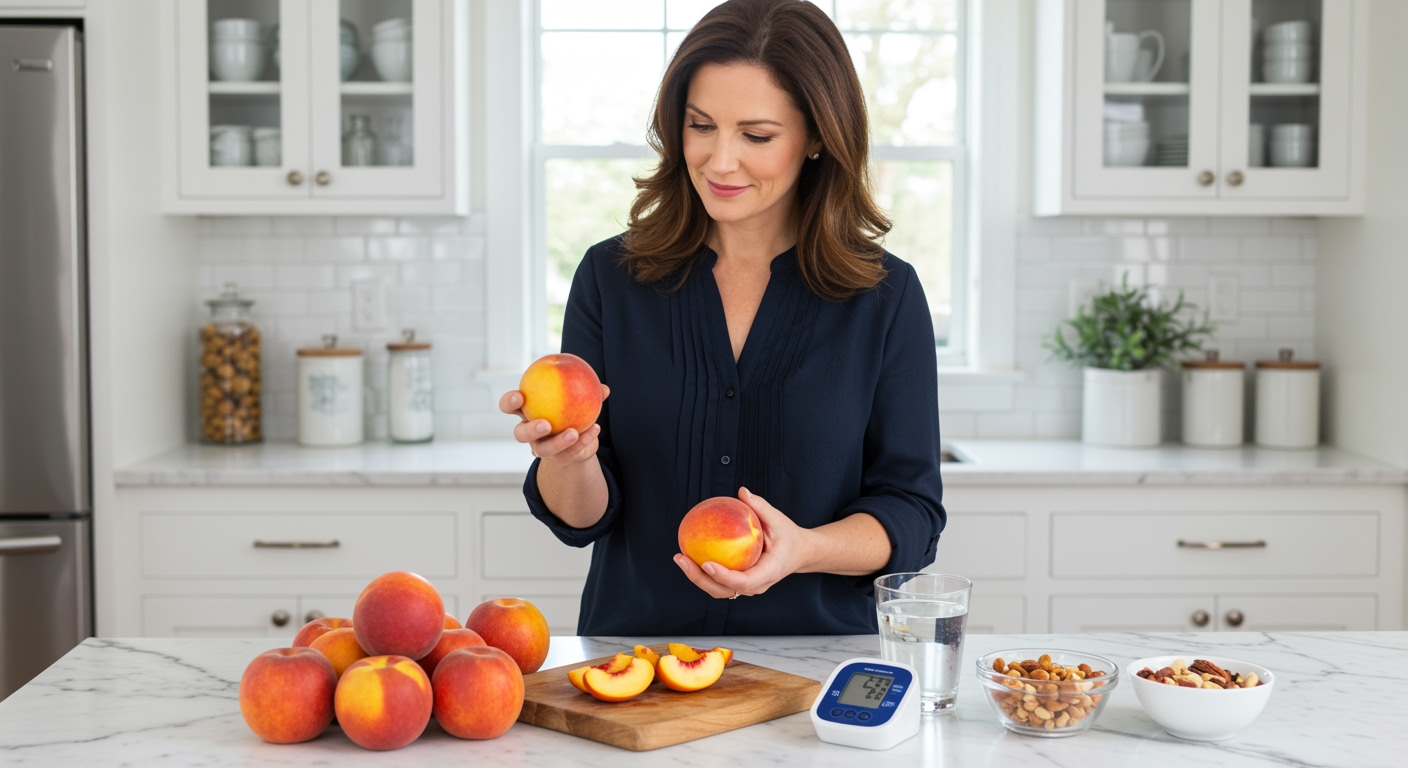✪ Key Takeaway: Peaches can help raise low blood pressure through potassium and natural sugars that support circulation.
Introduction
Your doctor just told you that your blood pressure is too low and you need to make dietary changes.
You might be wondering if sweet fruits like peaches could actually help boost your numbers instead of making things worse.
Hi, I’m Abdur, your nutrition coach and today I’m going to explain exactly how peaches affect low blood pressure and whether they deserve a place in your daily diet.
What Makes Peaches Special for Blood Pressure?
Peaches contain a powerful combination of potassium, natural sugars, and water that work together to support healthy blood pressure levels.
One medium peach provides about 285 milligrams of potassium, which is roughly 6% of your daily needs.
This mineral helps your blood vessels relax and maintains proper fluid balance throughout your body.
The natural fructose in peaches provides quick energy that can help combat the fatigue often associated with low blood pressure.
Unlike processed sugars, the fructose in whole peaches comes packaged with fiber and water that slow absorption and prevent blood sugar spikes.
Peaches also contain small amounts of magnesium and vitamin C, both of which support cardiovascular function and help maintain steady blood pressure.
✪ Fact: Fresh peaches contain 89% water, making them excellent for maintaining blood volume.
How Do Peaches Actually Raise Blood Pressure?
When you eat a peach, several mechanisms work together to gently increase your blood pressure to healthier levels.
The natural sugars provide immediate fuel for your heart muscle, helping it pump more effectively.
The high water content helps maintain adequate blood volume, which is crucial for people with low blood pressure.
Potassium works with sodium to regulate fluid balance and ensure your blood vessels maintain proper tone.
The fiber in peaches slows sugar absorption, preventing the blood pressure drops that can occur after eating refined carbohydrates.
This gentle, sustained effect makes peaches much better than processed snacks for people dealing with hypotension.
✪ Pro Tip: Eat peaches with a small amount of salt to maximize blood pressure benefits.
When Should You Eat Peaches for Best Results?
Timing matters when you’re using peaches to help manage low blood pressure.
Eating a peach in the morning can help prevent the dizziness that many people with low blood pressure experience when getting out of bed.
The natural sugars provide quick energy while the potassium helps stabilize your cardiovascular system for the day ahead.
Having a peach as an afternoon snack can combat the energy crashes that often accompany hypotension.
Avoid eating peaches late at night because the natural sugars might interfere with sleep quality.
For maximum benefit, pair your peach with a small amount of protein or healthy fat to slow absorption and extend the blood pressure supporting effects.
✪ Note: One to two peaches daily provides optimal benefits without excess sugar intake.
Are There Any Risks or Limitations?
While peaches are generally safe for people with low blood pressure, there are some important considerations to keep in mind.
People with diabetes should monitor their blood sugar carefully when adding peaches to their diet, even though the fiber helps moderate absorption.
The natural sugars in peaches can still cause blood glucose spikes in sensitive individuals.
Some people experience digestive upset when eating too many peaches due to their fiber and natural sugar content.
If you’re taking medications for blood pressure or heart conditions, talk to your doctor before making significant dietary changes.
Peaches alone cannot treat severe hypotension that requires medical intervention, so they should complement rather than replace proper medical care.
✪ Pro Tip: Choose fresh peaches over canned varieties to avoid added sugars and sodium.
The Bottom Line
Peaches can be a valuable addition to your diet if you’re dealing with low blood pressure, thanks to their potassium content, natural sugars, and high water content.
Small dietary changes like adding peaches create the foundation for lasting health improvements.
I’d love to hear about your experience with peaches and blood pressure management, so please share your thoughts or questions in the comments below.
References
At NutritionCrown, we use quality and credible sources to ensure our content is accurate and trustworthy. Below are the sources referenced in creating this article:
- Saber Health: Health Benefits of Peaches
- Healthline: Low Blood Pressure Diet
- PMC: Nutritional and Health Benefits of Peaches
- WebMD: Health Benefits of Peaches





